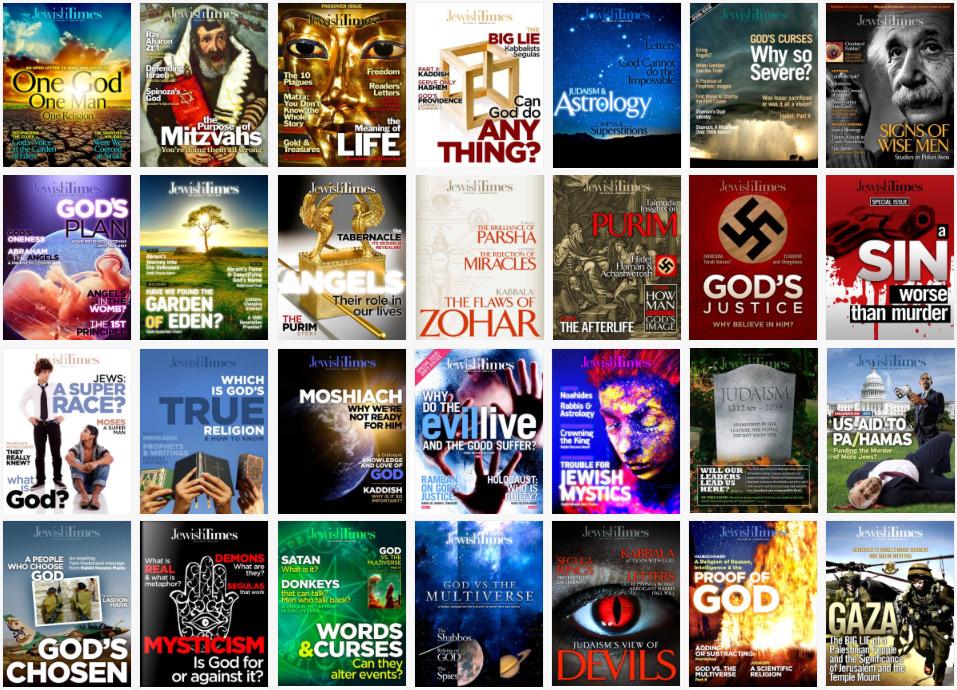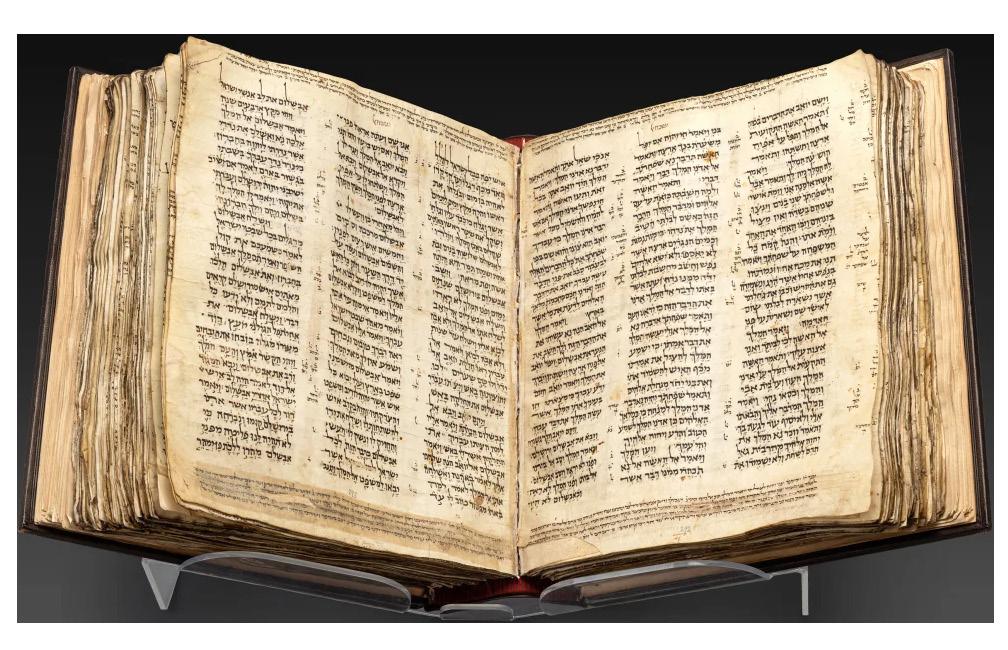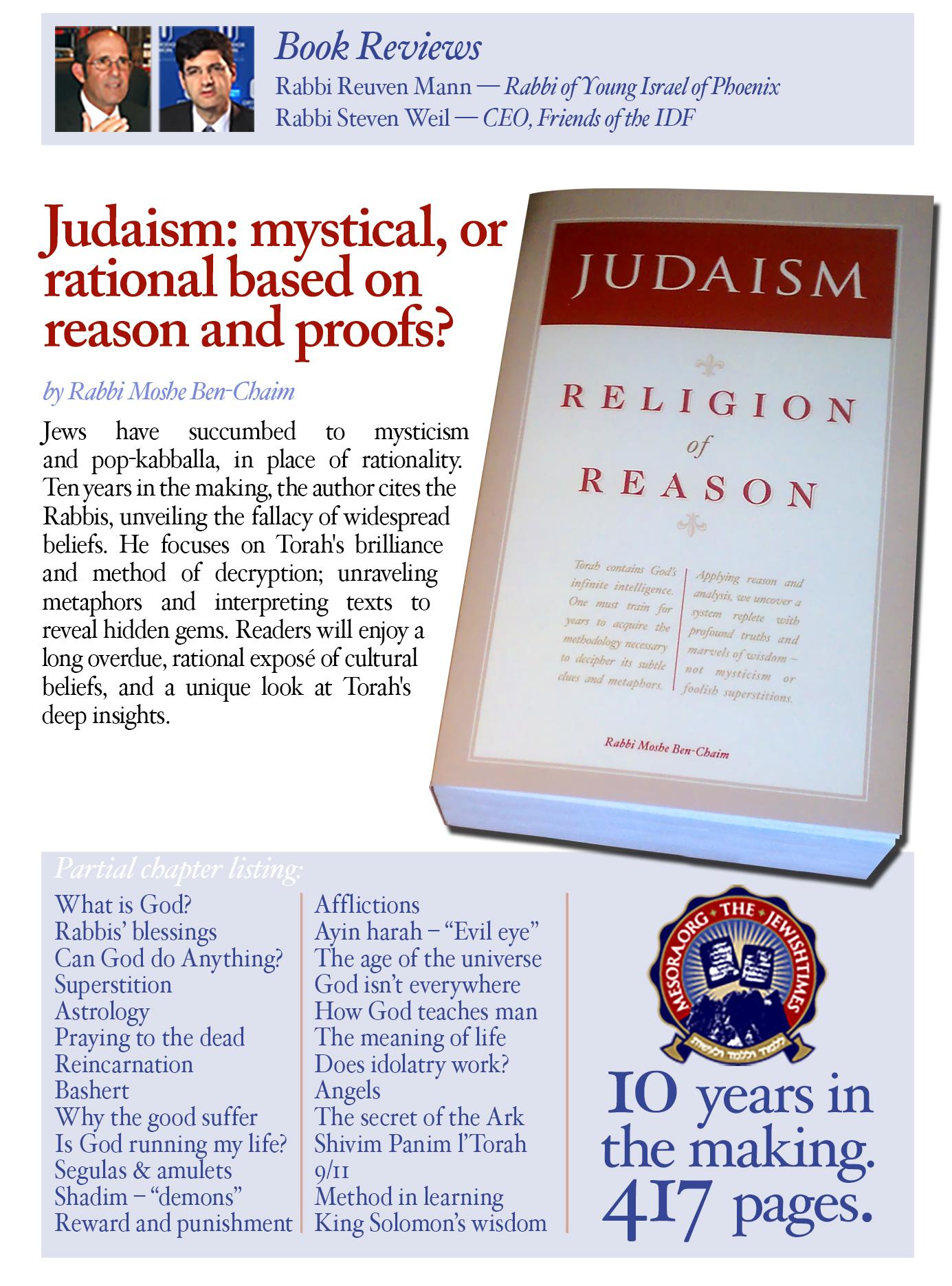






Song from Moses’ Heart


&

















Just click any icon in







THE JOURNAL ON TORAH THOUGHT
| Please send letters and questions to: Comment@Mesora.org |
RABBI MOSHE BEN-CHAIM
What’s the link between huts and vegetation
RABBI REUVEN MANN
A new song and a new message
RABBI ISRAEL CHAIT
King Solomon’s amazing psychological insights, derived from lectures by Rabbi Israel Chait
RABBI MOSHE BEN-CHAIM
Bible is not only the best life, it’s not an option

“God made Adam the First upright before him and just; and the serpent and Eve seduced him to eat of the fruit of the tree, because those who eat its fruit would be wise to discern between good and evil. And they brought upon him and all the inhabitants of the Earth the day of death; [then] they sought to find many calculations in order to bring deficiency upon the inhabitants of the Earth.” (TARGUM, KOHELES 7:29)
After Adam was sentenced to mortality, he sought luxurious bread (and other luxuries) as an excessive attachment to the physical to deny his mortality. (IBID., SFORNO, context added).
RABBI MOSHE BEN-CHAIM
Reader: Can you please explain the relationship of the lulav and etrog to the succah? On most holidays, there is usually a relationship between the mitzvos and the holiday like matzoh on Pesach, or the succah and Succos. So what is the purpose of the lulav and etrog? I am finding it very hard to find any information; of the many people I have spoken to, little information is known. The main response I get is, “We do it because we are commanded to by God.” Well, this of course is a given, but I find this response problematic.
(CONT. ON NEXT PAGE)

RABBI: In his book entitled Horeb[1], Rabbi Samson Raphael Hirsch explained a close relationship between the succah, esrog and lulav. I will mention his ideas, followed by my thoughts, stimulated by Rabbi Hirsch. The mitzvah of succah—a minimalistic home—intends to break man away from his materialistic lifestyle: the physical world is not the goal of our temporal earthly existence. And the 4 species embodies the correct attitude towards the source of all physical good: we give thanks to God for His bountiful harvest. Waving produce in all 4 directions—and upwards and downwards—we demonstrate that God alone has complete dominion over the world. The Talmud states, (Succah 37b):
Why do we wave the Lulav? R. Yochanan said, “We wave out and back (horizontally) to the One who owns all four directions on Earth. And we wave the lulav up and down to the One Who owns heaven and Earth.”
Rabbi Yochanan separates the two acts of waving “forward-back-left-right” from “up-down” to teach us that there are two areas of God's dominion which require our affirmation.
God is the sole Creator of all. This is why we wave up and down, referring to heaven (up) and Earth (down): all creation is contained in these two realms. But if up and down covers all creation, what is left to recognize about God’s greatness, as we must also wave in 4 directions?
These 4 directions refer not to creation, but to God's government of mankind: God has complete knowledge/governance of man’s “travels” on Earth (our actions), alluded to by these “4 directions.” The 4 directions depict man’s movement across Earth’s surface. This subtle difference points us to the realization that there are two distinct areas of God’s greatness:
1) God is omnipotent: He can do all, as He created heaven and Earth (waving up/down), 2) God is omniscient: He knows all, as He is aware of all our travels and actions (forward-back-left-right).
This theme is reiterated as the two main themes of the High Holiday prayers, Malchyos (omnipotence), and Zichronos (omniscience).
Rabbi Yochanan’s view is that waving the four species on Succos intends to demonstrate our acceptance and praise for God’s dominion in all areas: His creation (heaven and Earth), and His government of man (four directions). We wave His vegetation up and down to demonstrate that He created all that is above, and all
that is below. But He also governs all that He created, demonstrated by waving the species in all 4 directions. God’s omnipotence and omniscience is again on display in the Temple: the Menora possesses 7 branches (7=creation) and a Table of 12 showbread displays God’s providence (food) over the 12 Tribes.
Why must the Succah be temporal and frail by design? Koheles 7:29 says, “God created man upright, but they [man] have sought out many calculations.” Targum writes as follows:
God made Adam the First upright before him and just; and the serpent and Eve seduced him to eat of the fruit of the tree, because those who eat its fruit would be wise to discern between good and evil, and they brought upon him and all the inhabitants of the earth the day of death; [then] they sought to find many calculations in order to bring deficiency upon the inhabitants of the Earth.
Targum (Ibid.) teaches that it was only after bringing mortality to mankind, that Adam sought these many calculations. These calculations refer to man's obsession with
many physical preoccupations. Sforno writes, “Adam was involved in many troubles before he even ate bread.” [Simple bread is insufficient for the distorted man, who derailed the plan for simplistic physical needs, into a preoccupation with its preparation and many details, like sweetness.] God made man “upright”: to be satisfied with simple physical needs, but Adam toiled greatly for certain types of breads, to find very sweet things (Sforno).
(Rabbi Israel Chait)
Man denies his mortality by seeking a permanent attachment to life. He does so by chasing physical securities through riches and earthly permanence, expressed in building luxurious homes, expensive autos, and fine garments. But man must view God as his security, instead of viewing himself and the physical as real. With his attachment to physical security, man removes God from the equation and fails to appreciate God’s vital role. Therefore, God commands us to dwell in a flimsy structure for a week, as a detachment from our greatest physical security: our homes. God must retain central focus. Succah breaks man away from his desire for physical security.
Lulav complements succah by emphasizing the use of the physical for the right reasons. We thank God—the Source of our bounty—replacing our faulty view of the physical with proper thanks to God for providing sustenance. All physical objects we are fortunate to receive should be used in recognition of the Creator, and not to reaffirm our physical strength.
It also makes sense that Succah—not Lulav—is used to demonstrate man’s required break from the physical. Man's home is the one object which embodies earthy permanence...not so man’s food. Therefore, a frail home (succah) is used as opposed to fruits, which are consumed objects, and do not afford man the satisfaction of permanence. Since man does not attach himself to fruits as he does his home, the home is from where man must make his break. Succah breaks down man’s weighty attachment to the physical, while
lulav redirects man’s attachment towards God, the source of all our sustenance. This is the connection. This explains why we read Koheles (Ecclesiastes) on Succos. In this philosophical masterpiece, King Solomon presents the correct philosophy in relation to God, society, labor, security, wealth, success, pleasure, happiness, death, ego, accomplishments and myriads of emotions and philosophies. Numerous times King Solomon states, “What extra is there for man in all his toil that he toils under the sun?” He even commences his work with his summary, “Futility of futilities.” The Rabbis questioned King Solomon’s statement, “How can King Solomon say all is futile, when God said in Genesis that the world is very good?” The answer is that King Solomon only critiqued the physical as an ends in itself. When God said it was good, He meant that as long as it serves only as a “means” to man's pursuit of wisdom and a perfected life. There is no contradiction between King Solomon and God (Rabbi Israel Chait). Fulfill the obligations of this Succos holiday. Adhere to the commands of eating, drinking, and certainly sleeping in the succah, even light naps. Make the scach (succah covering) from detached plant life such as reeds, wood, or bamboo. Gaze through the gaps at the stars as you repose in your such, recognizing your Creator, the sole cause of the universe. Wave the 4 species in all horizontal directions demonstrating God’s exclusive dominion over all man’s affairs. Wave them upwards and downwards, demonstrating God’s exclusive creation of that which is up and down—heaven and Earth.
By living in these frail booths, we strip ourselves of our false security, and with our waving of the lulav, esrog, haddasim and aravos we redirect our security towards the One who provides sustenance, thereby realizing that our ultimate protection and security comes from God ■
[1] Soncino Press, 6th English Edition 1997, pp 132




RABBI REUVEN MANN

This week’s Parsha contains the special Shira (song) that Moshe composed to serve as a testament to all future generations of Jews. Their historical odyssey, its triumphs and tribulations, was based on their relationship with the Creator of the Universe. This was different from the Shira he had composed at the Yam Suf (Red Sea) after the great miracle of the drowning of the Egyptian expeditionary forces.
That Shira was focused entirely on proclaiming the greatness of Hashem in overpowering the mighty earthly forces of evil in order to save the innocent. The unspoken message of that song was that it was absurd to put one’s faith in humans, no matter how powerful they might appear to be. Rather mankind should realize that Hashem, Ish Milchama—‘G-d is the Man of War’ (Shemot 15:3) and they should always seek to align themselves with His Will.
From that perspective, we can detect a certain commonality with the Song that appears in HaAzinu. This one depicts the special relationship between Hashem and the Jewish People. The basic themes are that Hashem has established the Jewish Nation and provided them with a bountiful land which will provide for all their material needs. Nevertheless, we must remain mindful that this relationship carries conditions and responsibilities.
We must adhere to the true belief in Hashem and eschew all forms of idol worship. Additionally, we must diligently study and perform all the commandments so that we may elevate ourselves to be a light unto the nations (Yeshayahu 42:6, 49:6). Therefore, as long as we are true to this mission and keep ourselves pure from any defilement of idolatry, the protection of Hashem will be with us, and we will persevere and prosper. On the other hand, if we spurn the G-d of our fathers, violate the Mitzvot and reject His Torah, we will be subject to devastating—there is no other way of putting it—consequences. Moshe, in fact, accurately describes the historical trajectory of the Jews.
At the outset, they failed to clear out the idolatrous Canaanite nations from the land and ultimately succumbed to their primitive religious practices. As Jews, we must fully face the fact that our national spurning of Hashem and His Torah led to the lengthy exile, dispersion and horrible persecutions that have marked our past. All that we endured was punishment meted out, by the Hand of G-d. While drastic, it was not intended to destroy us, because the Covenant which binds us to Hashem is eternally unbreakable.
But the song of Moshe does not only foretell the degradation of the Jews. It states very clearly that in the end, Hashem will redeem His People and dispense payback against the evildoers who afflicted them. Moshe concludes,
“O nations—sing the praises of His People, for He will avenge the blood of His servants; He will bring retribution upon His foes, and He will appease His Land and His People.” (Devarim 32:43)
According to virtually all the Mefarshim (commentators), when Hashem effectuates great vengeance upon the godless criminals who gloried in the suffering they visited upon the Jewish People, neutral nations will witness it. They will recognize the uniqueness of the Jews and praise them greatly. Thus, in spite of the tragic events enumerated in this outline of Jewish History, in the “End of Days” the Jews will be redeemed and will fulfill their destiny of leading mankind to the true service of Hashem. The eloquence which marks this composition came about as a result of the unmatched precision of Moshe’s prophetic level. He began his peroration with a heartfelt petition,
“Give ear, O heavens and I will speak; and may the earth hear the words of my mouth. May my teaching drop like the rain, may my utterance glow like the dew; like storm winds upon vegetation and like raindrops upon blades of grass. When I call out the Name of Hashem, ascribe greatness to our G-d.” (32:1-3)
Moshe preceded his Song with the fervent prayer that his words would produce the effect on the people that rain and dew have in cultivating the soil and making it fruitful.
In this regard it is interesting to note that while some great leaders of history have been formidable orators with exceptional communication skills, Moshe Rabbeinu does not seem to have been among them. In fact, in his
protestations to Hashem, at the Burning Bush, about accepting the leadership role he mainly emphasized his woeful lack of speaking proficiency.
“Moshe replied to Hashem, ‘Please my Lord, I am not a man of words, not since yesterday, not since the day before yesterday, nor since you first spoke to Your servant, for I am heavy of mouth and heavy of speech.’” (Shemot 4:10)
The clear implication is that Moshe argued that a leadership mission of this dimension required someone who could communicate effectively, and that he was seriously deficient in this area. Yet in Parshat HaAzinu Moshe does not shy away from the task before him and confidently rises to the challenge of composing an eternal testament which will have a consequential impact on all generations of Jews who hear it. What happened to the person who had complained that he had difficulty in communicating himself effectively?
Some politicians and statesmen have attained a reputation of being great orators. In recent history, Winston Churchill was regarded as a master speaker who inspired his country to remain steadfast in their war against the Nazis by his masterful speeches. However, prior to the outbreak of war, many people dismissed the significance of his speech-making abilities.
Yes, he was good at the verbal pyrotechnics… Lloyd George said in 1936 that Churchill was ‘a rhetorician and not an orator’.… Lord Beaverbrook was one of those who helped propel him to power in 1940; but in 1936 he observed that ‘he lacks the proper note of sincerity for which the country listens’ (The Churchill Factor: How One Man Made History by Boris Johnson p.91).
However, all that changed with the outbreak of World War Two, in which Britain was fighting for its very life against a cruel and intractable foe. Churchill’s rhetoric then perfectly conformed to the danger and challenges of the moment, and,
“He found in the war the words to speak directly to people’s hearts—in a way that had perhaps eluded him in his previous career.” (Ibid p.96).
Without implying even the remotest comparison to Moshe Rabbeinu (our Teacher) Churchill’s example might shed some light on our subject. The essence of exalted communication is not the brilliant combination of words and phrases that is employed, but the message’s ability to penetrate listeners’ hearts. The great leader is the one who knows how to motivate the audience to undertake the difficult actions that are necessary to achieve a great objective.
(CONT. ON NEXT PAGE)
The Moshe who composed the Shira had grown far beyond the man who resisted Hashem’s call at the Sneh (Burning Bush). This does not mean that whatever defects impeded his speech were miraculously cured. But because of his leadership role, he had carefully studied the nature of the Jewish people. He now understood their emotional makeup and how to motivate and inspire them. His ideas in the Shira are presented with clarity and great precision. Moshe does not seek to soften or distort the truth but addresses the people with unfailing accuracy.
His goal as he states in the opening phrases is not to produce exceptional oratory but to affect the hearts of the listeners as water and dew activate the soil to give forth its fruits. The very personality of Moshe contributes to the effectiveness of his words. The people can vividly sense that he believes wholeheartedly in every word he utters, and his sense of conviction and absolute dedication to the welfare of his People transform him into the most effective communicator.
Parshat HaAzinu contains important lessons for us, especially in these challenging times. Most public figures seek to increase their popularity by polishing up their communication skills. People who are very gifted and smooth speakers have a distinct advantage because listeners tend to equate the message with the packaging. Much evil has been done by vile actors who could mesmerize their audiences with their provocative orations, which had the effect of shutting down their critical thinking abilities. Many politicians in the United States and Israel are able to deceive their gullible listeners by the attractive, but very superficial packaging, of their ‘positions’. They never take a stance on an issue without first polling to assess its popularity. In effect, they only tell their constituents what they imagine they want to hear and lack the integrity to present unpopular but necessary truths. This stands in absolute contrast to the one proclaimed as ‘Moshe Emet VeTorato Emet’—Moshe is true, and his Torah is true (Baba Batra 74a).
Democratic societies suffer from the gullibility of their citizens. We must raise ourselves to a higher level and examine the statements of would-be leaders in a careful and intelligent manner. We must avoid being swept along with someone because of an attractive personality and glib speaking style. Likewise, we must demand intelligent and truthful leaders whose positions coincide with our best interests and who can be trusted to keep their word. We will never get another leader like Moshe Rabbeinu, but that is the standard we must learn to strive for.
May Hashem assist us in this vital endeavor. Shabbat Shalom. ■





1:1) “The words of Koheles, son of David, king in Jerusalem.”
King Solomon wished to inform us of his qualifications to expose truths herein. “Koheles” is a derivative from the root “kahal”, meaning, a group. As king, King Solomon had all at his disposal to gather to himself the wise of his generation. His ideas were tested against the best minds; hence, his conclusions deserve earnest attention. As “son of David,” King Solomon had the greatest teacher. “Jerusalem” was the seat of wisdom (Sforno). We are informed of the King’s outstanding circumstances to arrive at the greatest truths.
1:2) “Futility of futilities, says Koheles, futility of futilities, all is futile.”
“Futile” is mentioned 7 times. Each word “futile” in the singular indicates 1, and each in the plural, 2. So the phrase, “futility of futilities” contains 3 references. 7 “futilities” are derived by adding all instances in this verse. 7 is indicative of the 6 days of Creation plus God’s rest on the seventh day. King Solomon associates futility with the Creation. The Rabbis asked, “How can Solomon deny what God said, “and God saw all that He made, and behold it (Creation) was very good?”
(Gen. 1:31) But King Solomon did not suggest Creation is futile. His intent is that when Creation is not used properly, only then it is futile. But when used properly, God is correct, “it is very good.”
So we must ask, “When is Creation abused, and when is it used properly? Additionally, aside from numerics, this verse must make sense in its plain reading. What is disturbing is what King Solomon means by “futility of futilities.” I understand what a “futility” is; if someone seeks something vain, or improper, we would call this a futility. But what is the additional futility to which King Solomon refers to as “futility of futilities”? What can be futile about a futility?


All books depict history, facts, theories, fiction or poetry. No book is coded with hidden messages beyond the words or patterns revealing marvels. But the Bible (Torah) was written by God, and is “coded.” The order of verses, use of certain phrases, apparent contradictions and other Biblical patterns are pur poseful clues to God’s wisdom.
This book unveils those patterns and shares the hidden messages.



Rabbi Chait said King Solomon’s second “futility” is referring to “fantasy.” Not only is the pursuit of money (for itself) a futile endeavor, but also, one’s fantasy about his plan—before he acts—is an additional futility. “Fantasizing” about any material pleasure is what King Solomon refers to. Not only is the acquisition a futility, but one’s energies being used for fantasy prior to the acquisition is an additional futility. King Solomon teaches that man doesn’t simply follow an emotional attraction, while his thoughts are blank. No. Man acts out his emotion as the last step in a series. Man’s first step is his arousal; he then conjures up a picture-perfect fantasy. He imagines the abundant wealth and possessions he will soon acquire. But this is all fantasy. It is a futile use of his energies, which could have been used to study, where happiness truly comes from. This is valuable time lost. Fantasizing is a futility, in addition to the actual amassing of wealth.
When is the physical an evil or a good? It is a good, provided one uses it as a means for a life of wisdom. All was created for the sake of man’s search for truth. If man uses any part of Creation without this goal in mind, he forfeits this goal. Of course, man has emotions, and they must be satisfied on some level. But satisfaction is so man is content enough to live a life as a philosopher. Torah does not prohibit indulgence, but overindulgence is not praised. “Kedoshim tihiyu”, “Sanctified shall you be” teaches that even with what is permissible, man should curb his indulgence.
1:3) “What additional (gain) is there to man, in all his labor that he labors under the sun?”
Rashi explains this to mean “earnings plus extra.” What “extra” is Rashi referring to? Is King Solomon criticizing one who labors to eat? This cannot be. But we do notice that he does not say “gain”, but “additional gain.” What is additional, over and above the earnings man receives for his labor? We must also ask a more primary question: what is so important about this question, that the King started his book with it?
One may view King Solomon’s verse as his own question. But you may also read it as the King’s verbalization of other peoples’ question. Meaning, King Solomon is merely reiterating the futile thoughts on man’s mind, not his own. King Solomon was exceedingly wise, let us not make the error of assuming his thoughts matched
ours. In this verse, King Solomon points to an emotional need in man. This need is the “extra” which man seeks out, in addition to his earnings. What is this “extra”? It may be a feeling of honor one desires, so he works hard for decades to rise above others for this attention. He may wish to be viewed as a sophisticate, so he dons certain clothing and dines at exclusive locations. But all these needs, emotional projections, or self-images, are of no use to one seeking the correct life. King Solomon correctly states, “what extra is there?” King Solomon teaches that man should be anchored in reality, not imagination. Honor is in one’s mind, as is one’s self-image of a sophisticate. Living a fantasy is futile. Only what is real, is worthwhile. Don’t seek the “extra”, the imagined self-images.
Rabbi Chait taught that King Solomon is exposing our base drive which underlies all others; the need for “accomplishment.” Man is seeking to accomplish much in his life. Why? After one’s needs are met, it appears that further accomplishment serves man’s desire to remove insecurity from himself. Too often though, a realistic security grows into an abundance of wealth, which is never spent. This too is yet another emotion, but it is the primary propelling force in man leading him to other imagined goals. This need to “accomplish” takes on many faces.
“Under the sun”: The fantasy of immortality is essential, if one is to create his other fantasies. If we knew we were dying, we could not invest our energies into amassing wealth. We would admit our time is ending. The reality of our mortality would be too stark, and it would tap all our energies. For this reason, King Solomon ends this verse with “under the sun.” He thereby teaches that the remedy to a life of fantasy is to contemplate that we have a limited lifespan.
“Under the sun” means, on Earth, a temporal earthly existence. This dose of reality helps one to temper his energies, and accept his mortality. With this reality factor, man will not so quickly indulge his fantasies. He will be safeguarded to keep his attention to what is truly real: God’s wisdom is eternal. In truth, man should be attached to what is eternal.
Sforno writes on this verse, (1:3) “And he (King Solomon) said this on man’s work under the sun in matters which are transient. For what use is this, that it is fitting for an intelligent being to strive at all to achieve (these matters)?” Sforno teaches that regarding matters, which are transient and temporal, man must not invest any time into them. It is a waste.
1:4) “A generation comes, and a generation goes, and the land eternally stands.”
What is the relevance of a “generation” and why do I need to know that one comes and goes? As we read through the book of Koheles, we must determine whether a given verse is King Solomon’s advice, or is it him voicing man’s ignorant opinions. The verses are either King Solomon’s proper instruction, or his exposure of man’s destructive emotional counsel. Be sensitive to the issues, and be mindful that this book was written by our wisest sage, and only after he analyzed man’s behavior. Remember; he was King David’s son, he was king, he had all the sages at his disposal to discuss and arrive at decisive, intelligent, and true concepts.
Clearly, with this verse, King Solomon attacks the core of the immortality fantasy, i.e., not only do individuals expire, but so do generations! Individual man is dwarfed by a generation. The insignificance of the self is undeniably admitted in the face of “mankind.” And in turn, mankind’s expiration dwarfs one’s individual, immortality fantasy. King Solomon wishes man to undermine this destructive fantasy of immortality. By doing so, man will not find the backdrop necessary for chasing fantasies. He will be forced to confront reality, and will then be guided only by truth.
“...and the land eternally stands.” If man is to truly accept his own mortality, there must be that which he recognizes “outlives” him. For if all would expire with one’s own death, the immortality fantasy would be replaced with yet another destructive phantasm; the ego. If one was unsure whether the world continued when he was gone, he would thereby feed his ego. Therefore, King Solomon aligns man’s expiration with the realization that the world continues even without us. The knowledge that the universe continues without us, is the necessary measuring rod for our mortality. There must be something against which we may contrast our lifespan, and that is the universe, which “eternally stands.” Contrasting the eternity of the universe to one’s own few decades, man is helped to confront his mortality.
1:5) “And the sun shines, and the sun sets, and unto its place it yearns (to) shine there.”
This is a prime example of the universe’s unrelenting nature. This sentiment substantiates the previous comment that only the world endures. It draws on an example of the most prominent, celestial sphere. We also learn that a created inanimate entity, undiluted with human agendas (i.e., the sun) performs perfectly as it functions precisely in line with its nature, designed by God. Man would be wise to take this lesson to heart. But what strikes us is the term “yearns” being applied to an inanimate object. How can the sun “yearn”?
More than other matters, one element is essential to understand human psychology: the unconscious. This is the ever-functioning but hidden part of our emotional make up. We have many desires, fears, loves, hates, and numerous other emotions, completely hidden from our consciousness. We are truly blind to them. These emotions, wishes and fears are manifest in our dreams; they cause our “slips of the tongue” and continually motivate us. If we do not analyze our dreams, and examine our actions and feelings, we lose out greatly: “An uninterpreted dream is like an unopened letter” (Tal. Brachos). We forfeit our perfection when we allow these unconscious forces to control us, and not the reverse. Perfection requires one to be in as much control of his actions and opinions as possible. Although many emotions are elusive and remain undetected, not reflecting on ourselves is unacceptable.
What is it that “yearns” to shine? What is “shining”? Perhaps King Solomon alludes to this unconscious, which does both; it “rises”and “sets.” It “rises”, as it pushes forth its force into what is in daylight (rising), i.e., consciousness. It also “sets”, as it recedes back into its hidden realm, the unconscious. It “yearns to shine,” means that the unconscious always seek to affect man, who is functioning in a waking state. “Yearning” to shine means that the unconscious forces are relentless in their “desire” to control our actions. “And Jacob was left alone, and a man wrestled with him until the coming of dawn” (Gen. 32:25). The verse says that Jacob was alone, yet he wrestled with someone; a contradiction. Rabbi Chait

resolved this contradiction by explaining that Jacob was in fact alone, but was really wrestling with himself; Jacob was the “man.” Jacob was wrestling with his unconscious. “until the coming of dawn”, means that which could not exist in daylight, in consciousness. We see daylight referring to man’s consciousness, and night referring to the unconscious. Jacob was fighting with some internal, unconscious element in his personality, indicated by the struggle ending at daybreak.
I find King Solomon’s selected metaphor revealing; he uses the sun (shemesh) for this lesson. “Shemesh” also means a servant, a “shamashe.” Perhaps this is fitting, as the unconscious should serve us, not control us.

1:6) “It travels to the South, and circles to the North, circling, circling, travels the wind, and on its circuit does the wind return.”
Rabbi Chait explained:
The King is not teaching patterns of weather. This book is about man’s quest for happiness. Therefore, this verse must be considered in that light. Here, the King addresses the perspective of the Rasha (wind is a metaphor for the Rasha). The Rasha feels as though he’s succeeding, or going places in life, viz., north, south, etc. But in reality, he goes nowhere: “and the wind returns again according to its circuits.” The wind repeats the same path. Verse 1:5 deals with how reality operates: man chases a desire, the experience or brief satisfaction expires, and he repeats his chase. While verse 1:6 deals with the subjective perspective of the Rasha: he attributes a value to his actions, as if “going places.” But why is the word “encircling” repeated? The first instance refers to man’s error in following his emotions in the first place. The second instance refers to the fact that man continues on his foolish path. Why does this occur? The first instance (man’s error) is committed due to man’s lack of reason. The second instance refers to the error in not heeding experience, which should teach man that he was initially in error.
One only imagines that he is “progressing” when he meets his own, subjective goals. His desire to progress is only progress in his own terms, and not true progress according to Torah perfection. Man wishes to build empires, but in God’s eyes, they are meaningless, and in fact, man regresses with such activity. How does

for man following this foolish cycle. One cause is what King Solomon stated in verse 1:6: man thinks he’s getting somewhere. But this is only a secondary cause. The primary cause is based on a need. That need is man’s great reservoir
their complete sensations? Is King Solomon describing the ineptitude of these organs? Or, perhaps he means to point us towards understanding that element in man, which

sun”, the arena which King Solomon

critiques. Man will only find the rejuvenating pleasure of novelty in the area of wisdom. All earthly attempts to fulfill this need will result in dissatisfaction.
Novelty has a funny way of vanishing immediately. Something is “new”, as long as it goes inexperienced. It is a “Catch-22.”
Before we attain something, or go somewhere, it is new, but we have yet to enjoy our imagined pleasure. And once we attain it, or get there, it is no longer truly new. How many times have we anticipated arriving at a new destination, only to be disappointed that when we arrive, the novel and alluring element of our vacation, i.e., being “there”, goes unrealized. We are not “there”, because once we get “there”, it is now
1:10) “There is a thing that you will say, ‘Look at this, it is new’, (but) it was already in history, that was before us.”
This verse seems repetitive. Also, what is the specific “thing” to which King Solomon
Rabbi Chait taught that this verse discusses the emotion of “modernity.” Man wishes to feel that he lives in THE generation. We hear people ridicule ancient societies as backwards. We have electronics; we have something new. We live on the final frontier. We are better than all other generations. Why do we wish to feel we are the most advanced generation? I believe such an emotion of modernity, attempts to deny mortality. If we live in the most advanced generation, this means, ipso facto, that no other generation may pass us: we will never
The cure for the imagined sense of modernity is to realize that others before us experienced what we do. Contemplating that other people have expired with history, forces us to recognize that what we experience as new, will also meet wit the same fate. We must identify with other generations: they have come and gone. We
(CONT.

desired the good for all mankind. This good, means knowledge of what is truth, and a dismissal of fallacy.
King Solomon describes so many of man’s pitfalls. Did God design man with destructive elements? No, He did not, “and behold it is very good.” He designed us with attitudes and emotions, which are to be studied, and directed towards living an extremely happy existence. “Ki yetzer lave ha’adom ra m’naurav”, “Mans’ inclinations are evil from youth” (Gen. 8:21) means that only our “inclinations”, not our faculties, are initially not steered by intelligence. They drive towards what is evil and harmful. But with devoted study and self-application of our knowledge, we are well equipped to direct our energies, emotions and attitudes towards the good. Man’s mind is more powerful and convincing than his emotions. With intelligence and proofs, we are fully capable of attaching ourselves to the life outlined in the Torah. By nature, man wishes to follow what he sees as true and good. This is our inherent design. As we study more and more, we abandon what is false, and naturally follow what is proven as good. Once we see a new idea clearly, we will naturally follow it. What is required, is to devote time to study, and endure research and analysis until we arrive at conclusive, proven opinions.
Man’s drives are only evil from youth. By nature, the emotions have a head start on intelligence. This does not forecast our inevitable destruction. Our continual Torah study will refine our thoughts, to the point, that we see with ultimate clarity, how to use our energies to attain a truly enjoyable and beneficial existence.
1:11)
“There is no remembrance to the first ones, and also to the later ones that will be, there will be no remembrance to them, with those that will be afterwards.”
Facing mortality, so clearly spelled out in the previous verse, King Solomon now closes the loop by addressing man’s final hope for mortality: to be memorialized in death. If man cannot achieve immortality in life, he still attempts to secure a memorial for himself. He wishes to go down in history. This fantasy strives at securing some vestige of his existence. But this will not be. How does King Solomon help man abandon such futility? He asks man to recall previous generations, and

man cannot, “There is no remembrance to the first ones.” This is an iron-clad argument against hoping for memorialization: time erases the history of everyone. King Solomon wisely advances man’s thoughts to the future, as if to say, “You think YOU will be remembered? Let us see if this happens.” The King’s response: “There is no remembrance of the first ones.” It does not happen to them, it will not happen to you, nor to any future generation. Reality is the best teacher, and King Solomon places reality between man’s eyes.
1. King Solomon’s “Qualifications” to address this topic.
2. “Fantasy”: The subject of Koheles.
3. “Accomplishment”: Man’s primary fantasy.
4. “Immortality”: The backdrop necessary for fantasy.
5. “The Unconscious”: The source of man’s fantasy life.
6. “Progress”: the goal of accomplishment.
7. “Energies”: Man’s abundant drive seeking satisfaction, and propelling his search for happiness.
8. “Independence”: Mans attempt to remove all insecurities by attempting to grasp complete knowledge.
9. “Novelty”: Where it is, and is not found; an inherent need in man.
10. “Modernity”: Striving for immortality in life.
11. “Memorialization”: Striving for immortality in death. ■

Rabbi Moshe Ben-Chaim
It’s for our good. God needs nothing; all which God created on Earth is for man to have all necessary physical needs for a good physical existence. Over and above “needs,” God also created plenty of pleasures to provide man a happy psychological state. Both target a life with a majority of time to study God’s wisdom, the goal of creation. But if man seeks “many calculations” (Koheles 7:29) by toiling for luxuries and excessive unnecessary physical enjoyments, he will be cursed in toiling all his days and won’t be given the opportunity to learn:
RABBI MEIR SAYS, “MINIMIZE BUSINESS AND ENGAGE IN TORAH. BE HUMBLE OF SPIRIT BEFORE EVERYONE. IF YOU NEGLECT THE TORAH, MANY REASONS FOR NEGLECTING IT WILL BE PRESENTED TO YOU. AND IF YOU LABOR IN TORAH, THERE IS ABUNDANT REWARD TO GRANT YOU” (Avos 4:10).
Of course the difficulty is that most people—even in the religious Jewish community—labor from dawn until dusk to attain a wealthy lifestyle. It is hard to depart from the lifestyle followed by most, and live with the bear minimum. But that’s what’s needed if one wishes to indulge most of his time in Torah. So we must cease from seeking applause, “Remove yourself from man” (Isaiah 2:22) and seek only God’s approval, which means to live

doing what truly provides enjoyment—Torah study. Seeking human applause is living in our imaginations; it’s fantasy. In fact, when we keep up with the Joneses, it breeds their jealousy, not their thunderous clapping for which we hoped. And Yom Kippur prayers advises man to “abandon the oppression of our hands.”
So we have identified one major drive behind the drive for luxuries and the inescapable 9-5 work lifestyle: peer approval. But God designed us to need quite little daily physical resources, so most of our day can be invested in what truly satisfies our design: His endless wisdom. But “wisdom” is not what mankind pursues, or even discusses. Rabbi Chait once said that movie stars and heroes are not models of great minds. Rather they are martial artists, superheroes, secret agents, race car drivers and the like. They are idolized for their strength and competition, not for their minds or character. This too steers the impressionable public away from admiring Rabbis, Aristotles and Einsteins.
But one who has experienced Torah’s beauty, and properly views Earth as temporary, will make the easy decision to “minimize business and engage in Torah.” He loses the desire to compete with his peers, and prefers uncovering more and more of God’s wisdom. This is Torah’s philosophy. The is what provides satisfaction, living in one’s mind and making discovery. In contrast, striving to maintain social status with expensive homes, cars, suits and vacations does not provide happiness. We were not designed to attain happiness with “things.” King Solomon experimented on
himself and discovered that no amount of wealth, palaces, servants, or wine yield happiness. Wisdom is what lit up his face (Koheles 8:1).
All wise men pursued wisdom and not physicality. They led were quite enjoyable lives.
If one says he doesn’t have to follow God’s will, he contradicts himself. For although he feels so convinced that following his own will is fully under his control—“By speech we shall prevail, our lips are under our control, who can be our master?”(Psalms 12:5)—however, he possesses that free will ability only due to God’s will that he exists! Thereby, he values God’s will that he exists with free will. He does not see his contradiction, that he rejects God’s will of Torah but welcomes God’s will of creating him. Pharaoh too said, “The Nile is mine and I made myself” (Ezekiel 29:3). Self-aggrandizement pervades the corrupt man’s thoughts. But the realistic man says “What am I?”—Moses. “I am dust and ashes”—Abraham. “I am but a worm”—King David.
AGAINST YOUR WILL YOU WERE CREATED, AND AGAINST YOUR WILL YOU WERE BORN, AND AGAINST YOUR WILL YOU LIVE, AND AGAINST YOUR WILL YOU DIE, AND AGAINST YOUR WILL YOU ARE DESTINED TO GIVE ACCOUNT AND RECKONING BEFORE THE KING OF KINGS, THE HOLY ONE, BLESSED BE HE (Avos 4:22)


Is Judaism mystical, or is it rational, based on reason and proofs?





